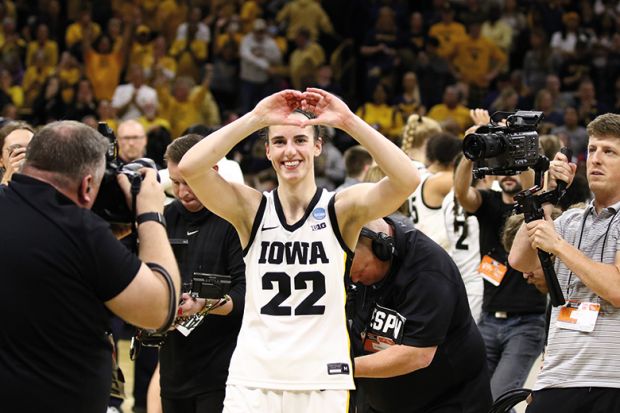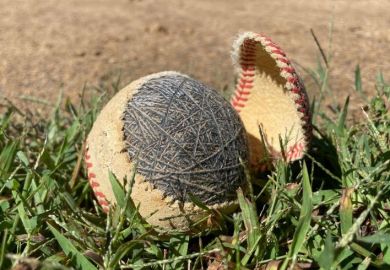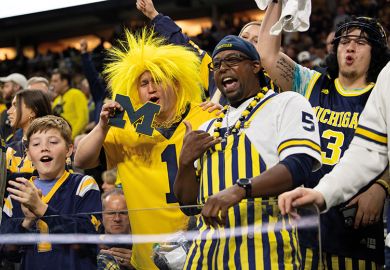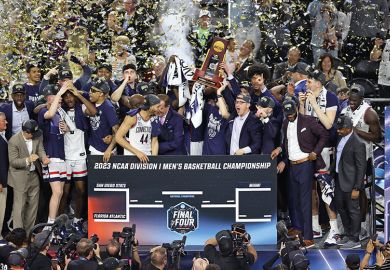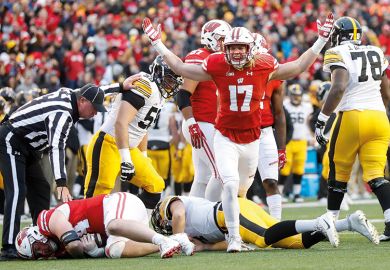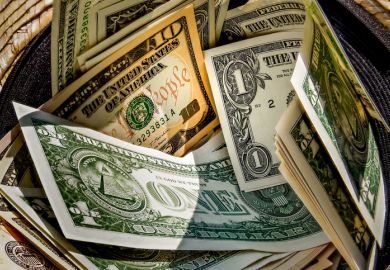The biggest draw in US sports over the past month has not been the golfer Tiger Woods, the Super Bowl-winning quarterback Patrick Mahomes or even the famed basketballer LeBron James.
Instead, Caitlin Clark, a 22-year-old basketball player, has captivated fans across the world and created unprecedented interest in college sport with her record-breaking performances for the University of Iowa.
Although the Iowa Hawkeyes came up short in the final of the National Collegiate Athletic Association (NCAA) Division 1 tournament, the impact of fans desperate to see her play, dubbed “Clarkonomics”, has drawn comparisons with the singer Taylor Swift for its boost to local economies.
The “Caitlin Clark effect” is already recognised as having helped to boost both women’s sport and college athletics, and academics also foresaw a significant upside for her institution, too.
La Quita Frederick, associate professor of the practice in sports industry management at Georgetown University, told Times Higher Education that the annual NCAA 68-team knockout tournament – known as “March Madness” – was a “pivotal event that has shaped and continues to shape the landscape of college athletics and higher education”.
Success in the tournament can catapult a college’s reputation, serve as a powerful recruitment tool for students, academics and athletes, and generate substantial revenue streams that extend well beyond the basketball court.
“March Madness is more than just a series of basketball games; it’s a driving force in the higher education sector,” said Dr Frederick. “The ‘Caitlin Clark effect’ underscores this phenomenon, where exceptional performances by individual players can thrust their schools into the national spotlight, potentially influencing enrolment numbers and enhancing diversity on campus.”
The Hawkeyes’ second successive run to the final – during which the long-range shooting expert Ms Clark broke the college scoring record for both men and women – played out in sold-out arenas across the country.
And the championship game against the University of South Carolina’s Gamecocks garnered an average of almost 19 million home viewers – more than the men’s edition, and even last year’s closing stages of the men’s professional league, the NBA Finals.
South Carolina – with its own stars in Kamilla Cardoso and Ashlyn Watkins – beat Iowa to claim its second title in three years. With the final attracting a peak audience of 24 million viewers, South Carolina said so many eyeballs “presents a unique opportunity to showcase the spirit of our university on a national stage”.
But despite losing, Iowa might end up the bigger winner. Recent estimates by the Common Sense Institute Iowa (CSI) show that record attendances at Iowa women’s basketball games during Ms Clark’s career contributed up to $52.3 million (£41.9 million) to her native state’s economy, with knock-on effects on everything from hotel room prices to restaurant bookings.
Ben Murrey, Iowa director of policy and research with CSI, told THE that the university’s revenue from ticket sales showed an “unmistakable Clark effect” – having increased from just $367,000 in 2019-20 to $1.5 million last year, and likely to have grown even more in 2023-24.
The CSI report found that Ms Clark’s career – in which she amassed more than 3,900 points – had boosted Iowa’s economy enough to pay tuition fees for up to 4,767 students.
“The bottom line is that folks across the state are better off because of the economic growth resulting from the Clark effect,” said Mr Murrey.
However, all revenue through ticket sales will benefit Iowa’s athletics department alone.
According to Amy Bass, professor of sport studies at Manhattanville University, this “age-old question” of whether sporting success supports only athletic and not academic programmes is one that came about long before Ms Clark.
“The money generated by athletics, when profitable, doesn’t exactly build libraries,” she said. “But sport – like musical theatre and dance programmes, as an example – is a critical facet of campus life, what sport ethicists call an ‘entertainment defence’ of athletics.”
And Ms Clark’s institution is already seeing an impact simply in that its women’s basketball programme is no longer a loss leader, said Professor Bass.
“Perhaps more important is the wild increase in alumni donations to Iowa in the wake of Clark: the pride in Iowa can largely be measured by its alumni support, and it’s apparently off the charts,” she added.
Analysis of Google Trends data shows that global searches for “University of Iowa” have reached their highest number for almost five years. The college is also seeing a record level of student applications for autumn 2024, although Professor Bass said it was hard to quantify how much of that could be attributed to Ms Clark.
“But sold-out games, Google searches and a star like Clark mean exposure that no admissions marketing programme can achieve,” she said.
“It isn’t exactly free advertising – basketball programmes cost money, too – but they are certainly getting far more out of it than they are putting into it.”
With her college career over, Ms Clark, who has almost 2 million followers on Instagram, looks set to take her star power to the professional ranks and join the WNBA.
A 2021 law change that allowed college athletes to sell their name, image and likeness like never before means Ms Clark has had a bigger reach.
As well as leading the Hawkeyes out on the court in front of millions of viewers in each game, Ms Clark has also appeared in prominent advertisements, including ones for Nike, Goldman Sachs and Buick – typically wearing her college’s white jersey each time.
“I live in New York, and you cannot miss Clark in Times Square,” added Professor Bass. “She is literally larger than life, and in New York City, no less.”
POSTSCRIPT:
Print headline: ‘Caitlin Clark effect’ a huge win for Iowa
Register to continue
Why register?
- Registration is free and only takes a moment
- Once registered, you can read 3 articles a month
- Sign up for our newsletter
Subscribe
Or subscribe for unlimited access to:
- Unlimited access to news, views, insights & reviews
- Digital editions
- Digital access to THE’s university and college rankings analysis
Already registered or a current subscriber?
